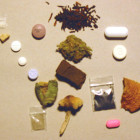
Marijuana Use Speeds Onset of Schizophrenia, Study Says
|
For those at risk, marijuana use hastens the onset of schizophrenia, according to a new study. Researchers found those with a genetic predisposition for psychosis would begin to experience symptoms an average of 2.7 years earlier if they smoked marijuana, and that can mean a greater disruption to their life. “We’ve known for many years that people who develop schizophrenia earlier have a number of poorer outcomes,” Michael Compton, co-author of the report, told the magazine Miller-McCune. Schizophrenia typically begins between the ages of 18 and 28. According to the researchers, developing symptoms earlier makes it harder for schizophrenics to succeed later in life because it impacts their ability to graduate high school or finish college. Even though the disease is genetic 80 to 85 percent of the time, many at risk have no family members who suffer from schizophrenia.



